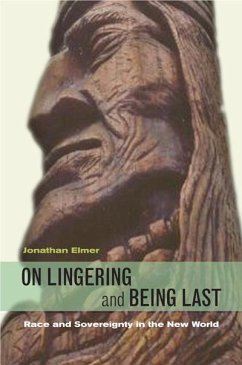What are we talking about when we talk about sovereignty? Is it about formal legitimacy or practical authority? Does it require the ability to control the flow of people or goods across a border; is it primarily a principle of international recognition; or does its essence lie in the power to regulate the lives of a state's citizens? Political theorists, historians, scholars of international relations, lawyers, anthropologists, literary critics-all approach the dilemmas of sovereign power with a mixture of urgency and frustration. In On Lingering and Being Last, Jonathan Elmer argues that the logic of sovereignty that emerged in early modern Europe and that limits our thinking today must be understood as a fundamentally racialized logic, first visible in the New World. The modern concept of sovereignty is based on a trope of personification, the conjunction of individual and collective identities. In Grotius, Hobbes, and others, a fiction of sovereign autonomy enabled states to be personified as individuals, as bodies politic, even as individual humans could be imagined as miniature states. The contradictions of this logic were fully revealed only in the New World, as writers ranging from Aphra Behn to Thomas Jefferson and Herman Melville demonstrate. The racialized sovereign figures examined in On Lingering and Being Last -the slave king Oroonoko, the last chief Logan, and their avatars-are always at once a person and a people. They embody the connection between the individual and the collectivity, and thereby reveal that the volatile work of sovereign personification takes place in a new world constituted both by concepts of equality, homogeneity, and symmetry-by an ideal of liberal individualism-and by the realities of racial domination and ideology in the era of colonial expansion. The conjunction of the individual, race, and New World territorialization, Elmer argues, is key to understanding the deepest strata in the political imagination of Atlantic modernity.
Hinweis: Dieser Artikel kann nur an eine deutsche Lieferadresse ausgeliefert werden.
Hinweis: Dieser Artikel kann nur an eine deutsche Lieferadresse ausgeliefert werden.








